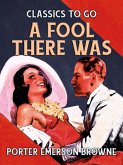In "A Fool There Was," Porter Emerson Browne crafts a compelling narrative that explores themes of love, betrayal, and the complexities of human relationships. The play delves into the life of a man ensnared by the charms of a predatory femme fatale, reflecting the societal mores and moral dilemmas of the early 20th century. Browne's dialogue is both sharp and poignant, revealing the internal struggles of the characters while providing a critique of Victorian social norms. The play is notable for its psychological depth and is set against a backdrop of emerging modern sensibilities, making it a vital piece of American drama that resonates with the existential anxieties of its time. Porter Emerson Browne, an American playwright born in 1871, was influenced by the rapidly changing cultural landscape of his era. His works often grapple with the intricacies of desire and the societal expectations placed on individuals. Browne's own experiences and observations of the tensions between traditional values and modern experiences equipped him with a unique lens through which he portrayed his characters, highlighting the universal struggles of love and fidelity. Readers are encouraged to explore "A Fool There Was" not only as a reflection of its time but also as a timeless exploration of the human condition. Browne's incisive storytelling and richly drawn characters offer profound insights that remain relevant today. This play is a must-read for anyone interested in American literature, drama, and the intricate dance of passion and morality.
Dieser Download kann aus rechtlichen Gründen nur mit Rechnungsadresse in A, B, BG, CY, CZ, D, DK, EW, E, FIN, F, GR, H, IRL, I, LT, L, LR, M, NL, PL, P, R, S, SLO, SK ausgeliefert werden.









